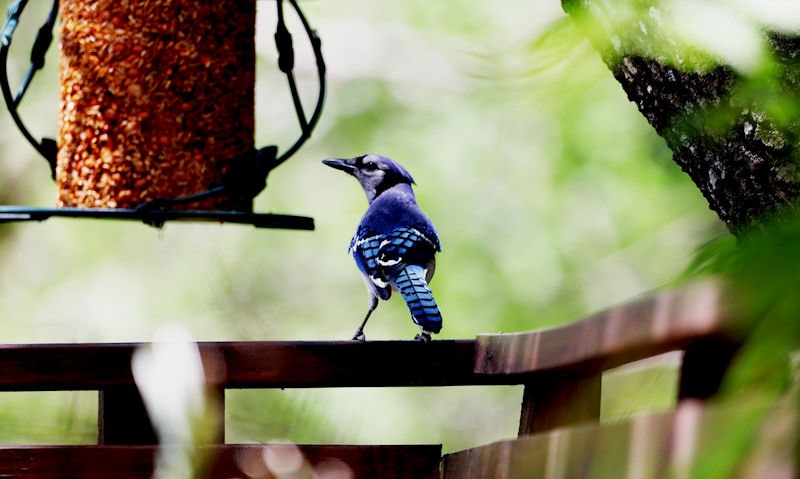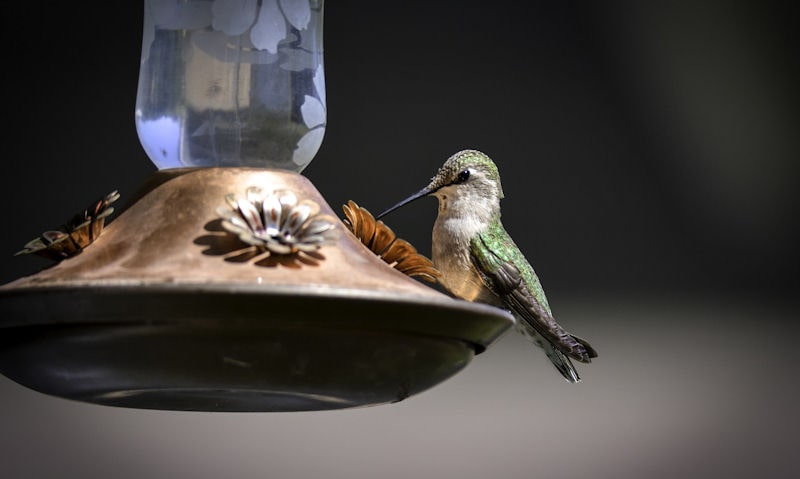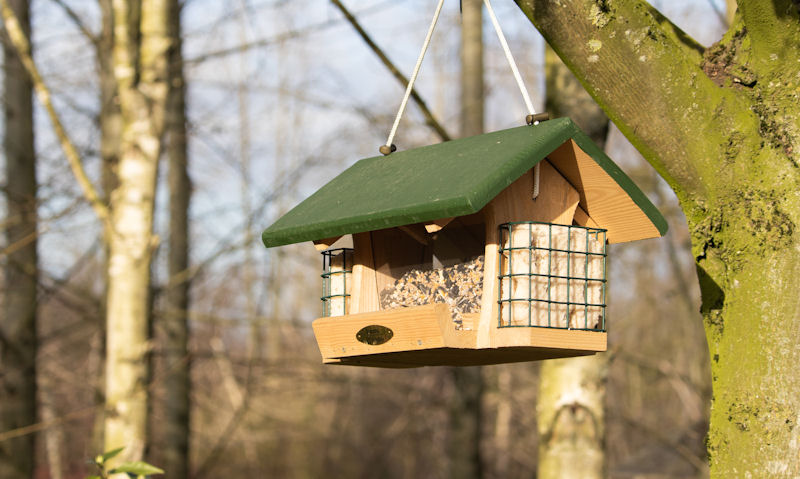Will a bird feeder keep bugs away
Bug numbers don't simply decline with the presence of bird eating birds at feeders, but more so insects are consumed on a daily basis, until numbers are visibly reduced.
Bird feeders will keep bugs away but only because certain bug eating backyard birds will eating them, when bird numbers in your yard increase. You'd need to attract insect eating birds only, with feeders attracting most. Don't forget feeders for Orioles and Hummingbirds, while accommodating ground foraging birds.
To setup up bird feeders with the promise of reducing bug numbers frequenting your yard, feeders can certainly help attract the birds that will eat them all.
Bug numbers do decline in the coming months, but in the meantime you'd need to attract bug eating wild birds as a priority - including those that forage on the ground, and higher up in trees and vegetation.
Set up classic seed, suet and peanut feeders if you wish to, but seeds must be thrown over the ground - to attract and accommodate ground feeding birds only.
Ground feeders can use open, easy to access platform and some hopper feeders, but a specialty ground level feeder can keep the food on the ground in order.
Now that you are inviting every bird species local to your yard, hopefully you'll see birds natural instincts take over, while foraging for bugs on the ground and in-flight, just as orioles and hummingbirds can do.
It can help to locate bird feeders near to where the bug issue is present, so bugs, insects, and even spiders are within reach of your feathered friend.
Bug numbers can decline
Indeed, if you were to setup a number of feeders, so not just the one bird feeder in your yard, you may see bug numbers decline.
Now, bugs won't be kept away with the presence of their natural predators, such as bug eating birds - but birds will gradually gobble them up.
Ground feeding birds such as Blue Jays and American Robins will take care of insects in the lawn, while certain species may eat insects on the fly. What that means birds catch insects while in-flight.
Contenders for this are orioles, but more importantly hummingbirds.
I would then suggest you not only setup up a series of suet, seed and, or peanut feeders to attract regular wild birds to your backyard - but do attract hummingbirds, and in turn orioles to scoop up flying bugs.
Bugs and insects that have been a nuisance to you over the months then are seen to disappear, as birds begin to consume them in large numbers.
Do try to attract as many bug eating birds as you can for this to work, or else birds will simply concentrate they eating behavior at your bird feeders only.
Feeders attract bug eating birds
Bird feeders that attract bug eating birds would bring you to mostly platform feeders, but the key is seed feeders, or seed bird food throw over the ground to attract bug eaters.
Here's a handful of bird feeder birds who are expected to frequent your garden regularly, but there's many more common backyards interested in eating up your bugs.
- Blue Jay - too big of bird to perch on hanging feeders, though an open platform or ground feeder will do the tick; Blue Jays eat caterpillars, beetles, grasshoppers
- Robins - prefer a ground feeder while consuming earthworms, snails, spiders, other invertebrates
- Sparrows - attracted to suet or seeds on all types of feeders, while eating mostly insects and other small invertebrates in the summertime
- Chickadees - less common at feeders but an open platform can attract them; while feeding on available caterpillars and insects, also spiders and snails in summer
- Black-throated Blue Warbler - Perch high on open top platform or hopper type feeder with seeds, but likely to eat caterpillars, moths, crane flies and spiders
- Common Grackle - eat off hanging seed hopper feeders but will eat beetles, grubs, grasshopper and caterpillars, including spiders, millipedes, earthworms
- Common Redpoll - feed on all types of nuisance insects but only during the summertime
- Dark-Eyed Junco - ground feeder will eat seeds at the feeder but can be seen foraging for caterpillars, beetles, grasshoppers, true bugs, and spiders
- Downy Woodpecker - natural habitat they forage on all kinds of insects and use any kind of feeders, otherwise seen to eat peanuts, suet or seeds
- Bluebirds - Eastern, Western or Mountain breeds rarely use a feeder, but may end up foraging for insects in your yard
- Northern Cardinal - Ground feeder would use an open platform feeder, but Cardinals are seen to forage for bugs on the ground
Concentrate your bird feeder purchases on open platform feeders, hanging or on a stand; including a hanging hopper feeder to accommodate as many breeds as possible.
Ground feeding birds are key
If you didn't know, many of the bird feeder eating birds that take to eating your seeds, peanuts and suet, are indeed happier eating off the ground.
And as you can imagine, ground feeding birds tend to forage for bugs and insects, including spiders in scrubs and vegetation, among many types of fruits.
While its vital to attract birds to eat off your bird feeder, remember the goal is for backyard birds to turn their attention to the bugs overwhelming your yard.
Birds can and will eat caterpillars, beetles, grasshoppers, earthworms, snails, spiders, other invertebrates - but this only applies to certain bird species.
Its vital then to accommodate as many breeds as possible, so a larger variety of bugs are consumed on a daily basis.
If only Blue Jays frequent your yard, then you'll only see caterpillars on leafs, beetles and grasshoppers in numbers decline.
Best thing to do when attracting ground feeding birds is to simply throw seeds or peanuts over your lawn or decking, in an area where birds currently reside daily and where the bug problem is mostly situated.
Otherwise, you can buy yourself a ground level bird feeder to keep the food organized.
Not all bugs disappear
Unfortunately, the presence of a bird feeder won't keep all bugs away, due to not attracting the right bird species that eat them, or it not working out as expected.
In fact, you might see birds happily eating at the bird feeders only, thus its best not to get carried away with an over abundance of tasty bird food.
Birds spend most of their day foraging for food to simply survive, so the availability of bird feeders is something they simply come to rely upon.
Its then a matter of hoping the number of bird species you've attracted to your yard with a series of bird feeders: begin to forage on what they usually forage on in the wild, namely bugs and insects on the ground, in trees and within your hedges.
When bird feeders become to busy, you can reduce food in feeders but then revert to throwing seeds on the ground; to at least bring the food within touching distance of the bugs on the ground.
What else would help is watering the lawn when possible to bring out the bugs, while a bird bath - preferably with running water - is setup near the feeders.
Bird feeders will not so much keep bugs away, but in turn birds would hopefully eat them when they arrive in your yard if they are visible, but that doesn't matter as much.
To summarize
Absolutely can bird feeders help keep bugs away, but don't view feeders as a deterrent, but more of a way for bug eating birds to be attracted to where there's bugs present.
Bug numbers can decline over the coming weeks and months if the introduction of bird feeders succeed, but it is a matter of trial and error.
You'd need to open up your feeder types to attract as many bird species as possible, with an open platform feeder, or a hanging hopper feeder doing the trick.
Not all bug eating birds are made to use feeders, but they will feed below feeders where there's scraps, or you can invite them to use a special ground bird feeder.
In turn, the abundance of bird feeders in your backyard would attract so many common birds, their natural foraging behavior takes over as the birds begin to eat all types of insects.
Ground feeding birds are key to keeping bugs away, as they are the biggest bug eaters.
Indeed, not all bugs will disappear, but its unlikely the bug issue will get any worse with more and more birds coming to your yard.
Regular bird feeders bring along many bug eating birds, but don't forget hummingbirds and orioles who are big bug eaters. So they will need their own specialty bird feeder, filled with nectar, not seeds or suet.


